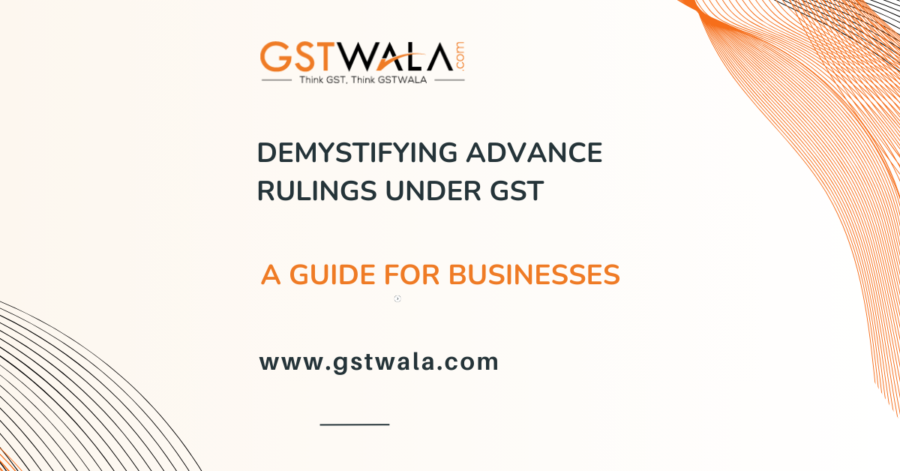
Demystifying Advance Rulings Under GST A Guide for Businesses
The advent of the Goods and Services Tax (GST) has heralded a paradigm shift in India’s indirect taxation landscape, reshaping the contours of fiscal policy and administration. In contrast to the fragmented and labyrinthine system of multiple indirect taxes that prevailed in the past, GST has emerged as a beacon of simplicity and coherence, consolidating disparate tax regimes into a singular and unified framework. This monumental reform has not only revolutionized the way we perceive indirect taxes but has also ushered in an era of unprecedented transparency and efficiency in tax administration.
One of the most intriguing facets of the GST regime is the provision for advance rulings, a mechanism designed to provide clarity and certainty regarding the tax implications of specific transactions. This mechanism serves as a potent tool for eliminating ambiguity and uncertainty, thereby fostering an environment conducive to business growth and investment. By enabling taxpayers to seek authoritative guidance on complex tax issues in advance, the advance ruling mechanism empowers them to make informed decisions and proactively manage their tax liabilities.
Introduction to GST and Its Impact
The implementation of GST has marked a monumental shift in India’s tax regime, replacing multiple indirect taxes with a single, comprehensive tax structure. This has streamlined tax administration and boosted economic efficiency.
Understanding Advance Rulings
Advance ruling refers to a decision provided by the Authority, the Appellate Authority, or the National Appellate Authority to an applicant on specified matters or questions related to the supply of goods or services. This mechanism aims to provide clarity on various tax-related issues before transactions are undertaken.
Key Provisions and Processes
- Matters Covered: Advance rulings can be sought on various matters, including the classification of goods or services, determination of tax liabilities, and applicability of notifications issued under the CGST Act.
- Eligibility: Any person registered or seeking registration under the CGST Act can apply for an advance ruling.
- Time Limit: The authority must pronounce its ruling within 90 days from the date of receipt of the application.
- Application Process: Applicants need to submit their requests through the GST common portal along with relevant documents and pay a fee of INR 5,000.
- Appeal Process: If aggrieved by the ruling, parties can appeal to the Appellate Authority within 30 days from the date of receipt of the advance ruling.
- National Appellate Authority: In cases of conflicting rulings by appellate authorities of different states/UTs, appeals can be made to the National Appellate Authority.
Recent Advance Rulings and Their Implications
Several recent advance rulings have provided insights into various aspects of GST law:
- Puranik Builders Ltd. (Maharashtra): Ruling on the treatment of additional charges received by the company concerning construction services.
- Kothari Sugars and Chemical Limited (Tamil Nadu): Ruling on the tax liability related to recovery of nominal amounts from employees for canteen services.
- KARNANI FNB SPECIALITIES LLP (West Bengal): Ruling on the reversal of Input Tax Credit (ITC) on the sale of alcoholic liquor for human consumption.
- IVL INDIA ENVIRONMENTAL R AND D PVT LTD (Maharashtra): Ruling on the liability to pay IGST on transfer of monetary proceeds to a foreign entity without the import of services.
- Bansal Industries (Punjab): Ruling on the liability to pay tax through reverse charge mechanism on raw cotton supplied by farmers.
- Isha Foundation (Karnataka): Ruling on the exemption of education provided by the applicant under GST law.
The Goods and Services Tax (GST) introduced the concept of an advance ruling mechanism, which has been a significant step forward in creating a more transparent and predictable tax environment for businesses. This mechanism allows taxpayers to proactively seek clarification from designated authorities on specific GST-related matters pertaining to their business activities. These matters can encompass a wide range, including the classification of goods and services under the GST framework, the applicable tax rate, the nature of supply (sale, barter, lease, etc.), and the place of supply – all of which are crucial factors in determining a business’s GST liability.
By obtaining an advance ruling, a taxpayer gains a clear and legally binding interpretation of the GST law as it applies to their specific situation. This advanced clarity provides several advantages. Firstly, it allows businesses to plan their operations and financial strategies with greater certainty. Knowing their exact tax obligations upfront eliminates the risk of unexpected tax demands arising at a later stage. Secondly, advance rulings can help businesses avoid potential disputes with tax authorities. With a pre-determined interpretation of the law, disagreements concerning classification, rates, or other aspects are less likely to occur. This translates into reduced litigation costs and administrative burdens.
However, the advance ruling mechanism is not without its challenges. One key concern is the potential for inconsistency in rulings issued by different authorities. GST being a relatively new tax regime, interpretations of the law can vary across different jurisdictions. This inconsistency can create confusion for businesses operating in multiple states, as they may receive conflicting rulings on identical issues. To address this, efforts are underway to ensure greater uniformity in the application of the advance ruling mechanism across the country. This could involve increased collaboration and knowledge sharing between authorities, along with the establishment of clearer guidelines and precedents.
Despite these challenges, the advance ruling mechanism remains a valuable tool for businesses navigating the complexities of GST law. It empowers them to make informed decisions, streamline their tax compliance processes, and ultimately contribute to a more stable and predictable tax environment.
Stay ahead of the curve with gstwala.com;
Together, let’s simplify GST for a smoother business journey.
We are just a click away info@gstwala.comTop of Form
